MercoPress. South Atlantic News Agency
Tag: 2014 FIFA World Cup
-
Wednesday, July 24th 2013 - 07:23 UTC
Rio subway breakdown adds to Monday’s security lapses in Pope Francis visit

Rio de Janeiro's subway broke down on Tuesday, causing chaos for throngs of pilgrims in town for a huge Catholic gathering and a papal visit already marked by security lapses. Crowds of people crammed into buses, scrambled to find taxis or began walking toward Copacabana beach for an evening mass to officially kick off World Youth Day.
-
Saturday, July 20th 2013 - 22:24 UTC
Tickets for the 2014 World Cup final will range from 440 to 990 dollars

FIFA has released the price list for tickets to the 2014 World Cup to be held in Brazil. Fans have until 10 October to apply and a ballot will decide which of the applications are successful.
-
Friday, July 19th 2013 - 06:03 UTC
Blatter joins Brazilian protestors, tells politicians “need to take responsibility”
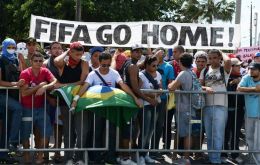
Sepp Blatter, president of FIFA, has placed heavy pressure on World Cup 2014 organisers Brazil, after witnessing the social unrest that accompanied the Confederations Cup during June.
-
Wednesday, July 3rd 2013 - 04:43 UTC
Brazil's Rousseff pushes political reform to quell discontent

President Dilma Rousseff sent Congress reform proposals on Tuesday intended to make Brazilian politics more representative in a bid to recoup popularity she lost in a wave of angry protests against the country's political establishment.
-
Wednesday, June 26th 2013 - 05:07 UTC
Massive protest expected in Belo Horizonte before the Brazil/Uruguay match
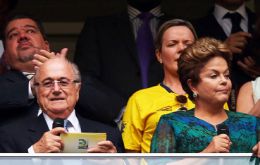
Demanding better public services and angered by World Cup costs, about 100.000 people are expected at a protest Wednesday before Brazil plays Uruguay in the Confederations Cup semi-finals.
-
Wednesday, June 26th 2013 - 04:58 UTC
Brazil: understanding with Congress to hold a reforms’ plebiscite on 7 September
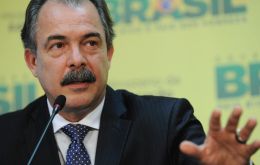
The Brazilian executive apparently has reached an understanding with the presidents of the Senate and the Lower House, Renan Calheiros and Henrique Eduardo Alves for a plebiscite with several questions referred to changes in electoral and party legislation, and eventually the Constitution relative to the political organization of South America’s largest country and powerhouse.
-
Saturday, June 22nd 2013 - 06:03 UTC
Rousseff pledges to meet protestors and their demands, but will also maintain order
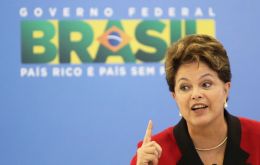
Brazilian President Dilma Rousseff promised on Friday to hold a dialogue with members of a protest movement sweeping the country, but also said she would do whatever is necessary to maintain order.
-
Friday, June 21st 2013 - 17:02 UTC
FIFA and the Confederation Cup in Brazil: “the show must go on”
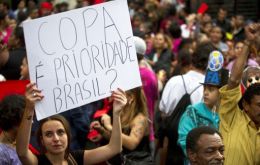
FIFA at no stage has discussed the possibility of canceling the Confederations Cup, which has been overshadowed by protests sweeping Brazil, according to a brief statement on Friday from soccer’s main organization following on reports from the Brazilian media.
-
Friday, June 21st 2013 - 06:16 UTC
Brazilian political system from surprise to shock as there seems no end to protests

Brazil's biggest protests in two decades intensified on Thursday despite government concessions meant to quell the demonstrations, as over 300,000 people took to the streets of Sao Paulo, Rio de Janeiro, Brasilia and tens of thousands more flooded an estimated one hundred cities.
-
Thursday, June 20th 2013 - 02:16 UTC
Sao Paulo and Rio roll back bus fares but protests keep spreading to other cities
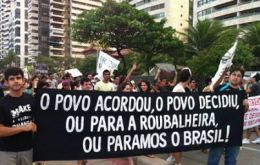
Brazil's two biggest cities agreed to revoke an increase in public transportation fares that set off demonstrations that have grown into nationwide protests against poor public services, inflation, corruption and lavish spending in stadiums to host global events.
